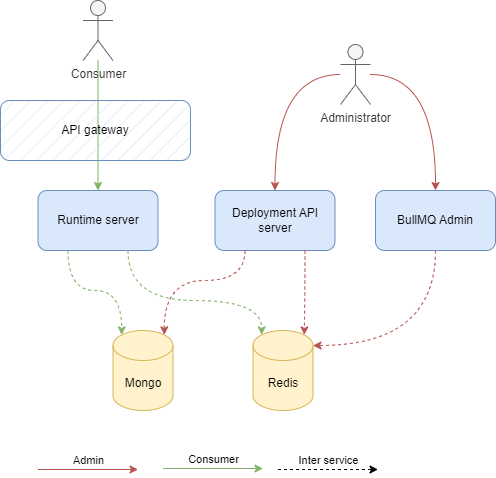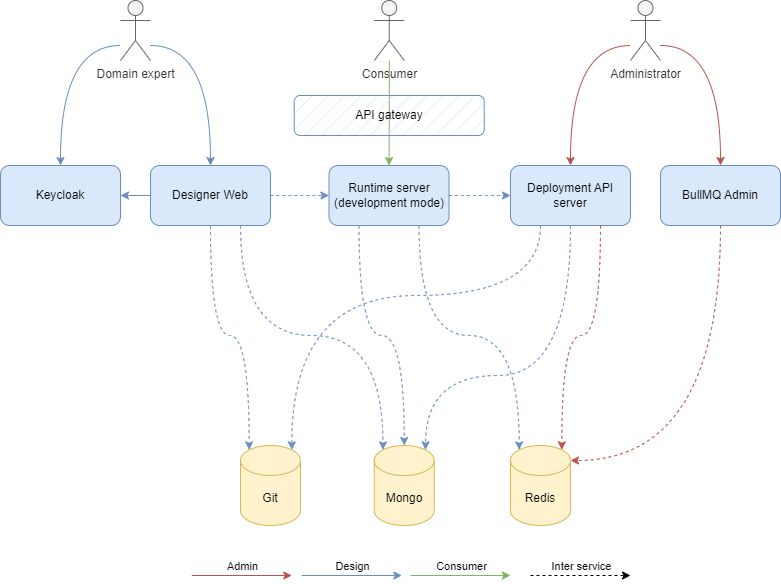ACE Components
The goal of this design document is to describe logical architecture of how ACE components interact with each other.
ACE can be deployed in 2 modes - Production and Development.
Production mode
Production mode is intended for production use and exposes only user defined Dynamic APIs. All ACE client requests are handled by runtime serve and deployment is done by deployment API server either through CLI or API.

Development mode
Development mode is intended for design and development. Runtime server in development mode exposes additional development APIs which are intended for development use only.

Service sizing
Please keep in mind that Sizing includes only resources needed by ACE components and do not include sizing for accommodating infrastructure (Operating System, Logging and Monitoring services, Cluster orchestration services, etc.).
PROD environment sizing is provided for 1000 concurrent users with 5 second think time. Where from ACE perspective the user is one API the call to the ACE Dynamic APIs. Please keep in mind that Sizing is provided for ACE overhead only. It can change Depending on complexity and availability of dependant systems, that ACE is accessing.
Sizing units are explained in this document. Total service requirements can be obtained by multiplying number of pod replicas with resources required.
In Sizing DEV/TEST and PROD means the environment type. If it is necessary to deploy both DEV and TEST environments, then required resources are 2 times the sizing provided below.
| Service | DEV/TEST (Pods, vCPU, RAM, Disk) | PROD (Pods, vCPU, RAM, Disk) |
|---|---|---|
ace-designer | 1, 250m, 256Mi, 5Gb | Not intended for use in production. |
ace-runtime-server | 1, 500m, 256Mi, 5Gb | 2, 500m, 512Mi, 5Gb |
ace-deployment-server | 1, 250m, 256Mi, 5Gb | 1, 500m, 256Mi, 5Gb |
bullmq-board | 1, 250m, 128Mi, 5Gb | 1, 500m, 256Mi, 5Gb |
api-developer-portal | 1, 100m, 128Mi, 5Gb | 1, 100m, 128Mi, 5Gb |
Services
All environment variable keys and values below are case-sensitive
Designer Web
Designer Web application is ACE Designer version for use in browser. It requires Designer runtime server in deployment mode in order to test and execute Dynamic APIs and flows.
Designer Web is the Single Page Application that itself contains only UI code for ACE Designer. It is deployed as the static "Javascript/HTML" package with backend APIs.
Container
- Name:
ace-designer - Port:
5090
Deployment options
| DEV/TEST | PROD |
|---|---|
| Required if need to use Designer in browser | Not intended for use in production |
Configuration options
See Designer Web configuration for detailed configuration options.
Designer Desktop
Designer Desktop application is ACE Designer version for use on local machine. It doesn't include ACE runtime server - it needs to be launched separately via Docker.
Runtime server
Designer runtime server implements Flow Runner Runtime and hosts Dynamic APIs and Development APIs.
Container name
ace-runtime-server
Container port
Port exposed by docker image is 5050
Deployment options
| DEV/TEST | PROD |
|---|---|
| Required. Development mode should be enabled if Designer Web is deployed. | Required. Development mode must be disabled. |
Configuration options
See Runtime server configuration for detailed configuration options.
Deployment API server
This service provides an API interface for Mongo based workspace deployments and other deployment related actions.
The ACE CLI tool comes pre-packaged with this service and can be used by running the command
ace-cli.
The CLI tool is necessary for deploying workspaces and installing schedules in production.
Container name
ace-deployment-server
Container port
Port exposed by docker image is 5051
Configuration options
See Deployment server configuration for detailed configuration options.
API Gateway
API gateway which is used to safely (by adding authentication and rate limiting policies for example) expose ACE services to the outside world.
It can also be used to add SSL certificate and expose ACE services via HTTPS protocol if it is not done by load balancer.
API gateway choice is client specific, most common options are cloud based solutions like Azure API Gateway or Amazon API Gateway. Good option for on-premise solution is Kong gateway.
Deployment options
| DEV/TEST | PROD |
|---|---|
| Add additional authentication options to Dynamic APIs, expose ACE services for performance profiling, etc. | Use to expose Dynamic APIs to outside world. |
Developer API portal
Developer API portal is used to host API documentation and provide API consumers with information about available APIs.
OpenAPI file must be copied to /usr/share/nginx/html/openapi/api.yaml in order to be available in the portal.
Container
- Name:
api-developer-portal - Port:
5070 - Volume:
/usr/share/nginx/html/openapi
Deployment options
| DEV/TEST | PROD |
|---|---|
| Optional, can be used to review documentation | Optional, deploy if required to expose API documentation. |
Mongo
Mongo can optionally be used to enable persistent user settings. It is also used for dynamic deployment (as opposed to file based Docker image deployment).
Deployment options
| DEV/TEST | PROD |
|---|---|
| Required if using persistent user settings or Dynamic deployment. | Required if using Dynamic deployment. |
Scaling
Refer to the Mongo documentation for scaling.
Redis
Redis is used for step level cache and scheduled job persistence. It is recommended to have a separate instance for cache and scheduler as it allows better control over stored data.
Note that scheduler requires redis instance to have noeviction policy to reliably run scheduled jobs. With other
policies scheduled job entries can be removed from redis before execution.
It might not be the best solution for cache purposes if Redis instance is shared. As Redis doesn't allow eviction policy
per DB it's necessary to use a separate instance if different eviction policies are required.
Deployment options
| DEV/TEST | PROD |
|---|---|
| Required if cache or scheduler is used. | Required if cache or scheduler is used. |
Scaling
Refer to the Redis documentation about how to scale the Redis.
Keycloak
Keycloak is used for Designer Web authentication. It can optionally be used for Dynamic API protection, but API gateway based approach is recommended.
Deployment options
| DEV/TEST | PROD |
|---|---|
| Required for Designer Web authentication. | Not required unless used for ACE Dynamic API protection. |
Scaling
Refer to the Mongo documentation for scaling.
BullMQ Admin
Default BullMQ administration tool (Bull Board) for which is used for scheduled jobs. It allows to view and manage scheduled jobs.
It is not mandatory, and it's possible to use any other BullMQ management tool if required.
If ACE scheduler feature is not used, then this service is not necessary.
Container name
bullmq-board
Container port
Port exposed by docker image is 3000
Configuration options
PORT(default "3000") - port used by serviceBULL_PREFIX(default "bull") - BullMQ prefixREDIS_HOST- Redis hostREDIS_PORT- Redis portREDIS_PASSWORD- Redis authentication keyREDIS_DB- Redis DB numberREDIS_USE_TLS- Flag, set totrueif redis is tls configured.REDIS_TLS_KEY- TLS private keyREDIS_TLS_CERT- TLS certREDIS_TLS_CA- TLS CAACE_PROXY_PREFIX(since 25.7.0, previouslyPROXY_PATH) - path prefix for admin UI panel. Prefix will be removed from path by server. If BullMQ Admin is meant to be exposed on a different url path, then this variable should be set to that path. For example, if requests are proxied tohttps://ace.sapienspaas.com/bullmq/, thenACE_PROXY_PREFIXshould be set to/bullmq.
Deployment options
| DEV/TEST | PROD |
|---|---|
| Recommended if scheduler is used. | Recommended if scheduler is used. |
Versioning
Versioning service is removed from ACE 5.31.0
Versioning is container which ships with ace-versioning CLI. It is used for scheduled job deployment and container
is run as one-off script.
Container name
ace-versioning
Deployment options
| DEV/TEST | PROD |
|---|---|
| Required if scheduled jobs are used | Required if scheduled jobs are used |
Configuration options
REDIS_CACHE_HOST- redis host.REDIS_CACHE_PORT- redis port.REDIS_CACHE_USER- redis username.REDIS_CACHE_KEY- redis authentication key.REDIS_KEY_PREFIX- prefix for redis cache keys (default:ace-cache).REDIS_CACHE_DB- redis database numberREDIS_CACHE_TLS_ENABLED- Flag, set totrueif redis is tls configured.REDIS_CACHE_TLS_KEY- TLS private keyREDIS_CACHE_TLS_CERT- TLS certREDIS_CACHE_TLS_CA- TLS CAREDIS_CACHE_URL- Fully qualified URL withredis://or securerediss://protocol. If provided,*-HOST,*-PORT,*-KEY,*-CERT,*-CAvariables will be ignored.SCHEDULER_REDIS_HOST- redis host.SCHEDULER_REDIS_PORT- redis port.SCHEDULER_REDIS_USER- redis username.SCHEDULER_REDIS_PASSWORD- redis authentication key.SCHEDULER_REDIS_PREFIX- prefix for redis cache keys (default:bull).SCHEDULER_REDIS_TLS_ENABLED- Flag, set totrueif redis is tls configured.SCHEDULER_REDIS_TLS_KEY- TLS private keySCHEDULER_REDIS_TLS_CERT- TLS certSCHEDULER_REDIS_TLS_CA- TLS CASCHEDULER_REDIS_URL- Fully qualified URL withredis://or securerediss://protocol. If provided,*-HOST,*-PORT,*-KEY,*-CERT,*-CAvariables will be ignored.WORKSPACE_MOUNT_PATH_(default "/var/workspace") - path to ace workspace
Sizing
Versioning image is used as one-off script.
Designer proxy
Designer proxy service is removed starting with ACE version 5.28.0. Service can be safely removed when moving to a newer version.
Repositories other than azure devops are not supported in web by isomorphic-git. To support these repositories proxy
is required.
Container name
ace-designer-proxy
Deployment options
| DEV/TEST | PROD |
|---|---|
| required when repositories other then azure devops are used | required when repositories other then azure devops are used |
Configuration options
- Generic options
LOG_LEVEL(default "info") - service log verbosity level. Possible valueserror,warn,info,http,verbose,debug,silly.
Scaling
All ACE services can be scaled horizontally. For DB scaling see corresponding DB documentation.
Logging
All ACE services are logging according to env variable LOG_LEVEL supplied to the service. It is possible to capture
logs in any Log aggregation solution by capturing what is being logged to stdout.
To prevent GDPR related issues sensitive data is not logged by default
User can provide following env variables in 'Settings' related to logs.
FULL_DATA_LOGGING = true to enable logging of sensitive data.
ACE_LOG_EXCHANGE = true to log request(url, method, body) and response(statusCode, body) related data at info level.
It is also possible to log custom business information using "Logger" step in flow
Security
When exposing Dynamic APIs to Consumers use API Gateway or any other infrastructure components to secure Dynamic APIs.
Monitoring
There are no considerable warmups livenessProbe and readinessProbe can be defined on per $HOST:$Port basis where
/health endpoint is not defined.
Health endpoint /health in services can be used to check health of service. Available in services
ace-runtime-server,ace-designer, ace-deployment-server.
Diagnostics endpoint /diagnostics in services can be used to check dependant services and databases connectivity.
Available in services ace-runtime-server, ace-designer, ace-deployment-server.